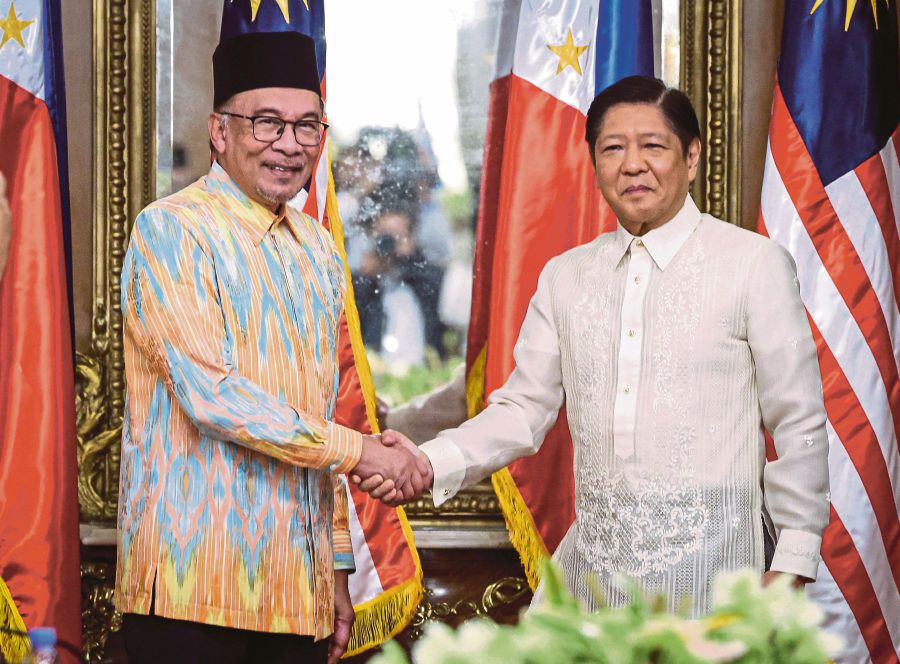The recent official visit by Prime Minister Datuk Seri Anwar Ibrahim to Manila is notable for the fact that he is the first Malaysian leader to have made it that far since the fall of the Barisan Nasional federal government in 2018.
All his three immediate predecessors only made customary calls as new leaders to immediate Asean neighbours Indonesia, Brunei and Singapore.
Anwar has made it to all the other four original Asean members plus Brunei. Given our post-2018 political fluidity, this is no mean feat. If our regional diplomacy is not to wither, the prime minister must soon complete the tour of Asean by visiting the Indochinese states.
The Philippines has never been shy about acknowledging that it is mostly populated by those of the Malay race, even if the majority of them are Roman Catholics. It must, therefore, be included in the broadest definition of the Malay Archipelago or the concept of Nusantara.
After more than half a decade without any bilateral summit between Malaysian and Philippine leaders, the vibes generated by Anwar with the new Philippine president, Ferdinand "Bongbong" Marcos Jr, were all positive.
This is all the more remarkable for the fact that there is no shortage of bilateral issues that can potentially trip up Malaysia-Philippines relations.
The status of Sabah is a perennial sore point between Putrajaya and Manila. Yet, it hardly registered in the overall feel-good messages both Anwar and Marcos transmitted during the former's Manila visit.
When it comes to territorial disputes, neither Anwar nor Marcos can afford to be seen as yielding even an inch. It helped that Marcos has kept a very scrupulous silence even in the face of a rather high-profile international pursuit of Malaysian assets by some supposed claimants purporting to be recognised heirs of the defunct Sulu sultanate.
While the recognised Sulu heirs had officially acceded to Manila on the territorial aspect of the Sabah claim, they retained what is called the proprietary aspect, best represented by the annual "lease" payments which the Malaysian government kept paying until the Lahad Datu "invasion" of 2013.
It is important to keep in mind that these two aspects are separate, if interrelated, issues.
The Marcos administration seems to recognise that there is nothing to be gained by officially reviving the issue at this time, even if dropping it altogether may also prove politically problematic.
Perhaps the best solution is to set this potential thorn in bilateral relations aside for now, especially when far more serious territorial disputes confront both Malaysia and the Philippines, for example, China.
Rather, the two Asean neighbours may more profitably focus on bilateral economic and trade issues. They should explore ways to enhance bilateral cooperation, which previously led to peace returning to Mindanao and the establishment of the Bangsamoro Autonomous Region of Muslim Mindanao (BARMM).
Much more can and must be done by both the central governments in Manila and Putrajaya to realise the peace dividend.
A window still exists for proactive political interventions to ensure concrete and substantive investments are made to turn guns into ploughshares.
Given the active intermediary role Malaysia pursued to finally realise Bangsamoro peace, it is in our own enlightened self-interests to now help bring economic prosperity to sustain the peace.
An opportunity might have been missed for Anwar to make a side-trip to Mindanao to highlight what peace has wrought and also what more needs to be done to reinforce it. BARMM, after all, adopted the Malaysian parliamentary model. Instead of an executive governor heading its administration, its head of government is styled as the chief minister, who is appointed to lead a transitional government.
An elected BARMM chief minister will take over in due time and cement the political gains of recent years. Malaysia has almost as much stake in seeing such a consolidation succeed as the Philippines.
* The writer views developments in the nation, region and wider world from his vantage point in Kuching



